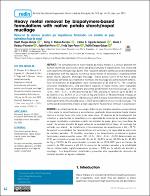Heavy metal removal by biopolymers-based formulations with native potato starch/nopal mucilage
Date
2020Author(s)
Choque Quispe, David
Ramos Pacheco, Betsy S.
Ligarda Samanez, Carlos A.
Barboza Palomino, Gloria I.
Kari Ferro, Aydeé
Taipe Pardo, Fredy
Choque Quispe, Yudith
Metadata
Show full item recordAbstract
The contamination of water bodies by heavy metals is a critical problem for
human health and ecosystems, and it can bioaccumulate in organisms to toxic levels and
even lead to the living being’s death. This research aimed to synthesize and characterize
a biopolymer with the capacity to remove heavy metals in wastewater, elaborated from
potato starch, glycerin, and nopal mucilage. Native potato starch of the Allcca sipas
variety was extracted by conventional methods; the mucilage was extracted with ethanol.
Four formulations of biopolymers were synthesized at 60 and 70 °C. The solubility,
structural characteristics, and adsorption capacity of heavy metals were evaluated.
Starch, mucilage, and biopolymers presented predominant functional groups as -OH,
-C-O-, -NH-, -C-H-, -C-OH determined by FTIR, allowing to remove up to 50.18% of
Al, 56.81% of As, 35.95% of Cr, 37.43% of Hg and 73.22% of Pb determined through an
ICPE-OES, for a contact time of 100 minutes at pH 5.0, heavy metal removal and solubility
were significantly influenced (p-value < 0.05) by the addition of starch and mucilage. The
synthesized biopolymers present a high capacity for heavy metal removal in wastewater
Collections
The following license files are associated with this item:

